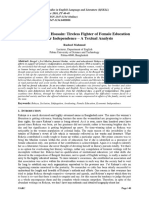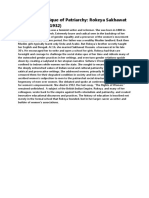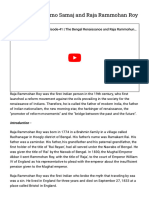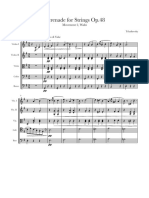Rokeya Sakhawat Hossain
Rokeya Sakhawat Hossain
Uploaded by
Asif ImtiazCopyright:
Available Formats
Rokeya Sakhawat Hossain
Rokeya Sakhawat Hossain
Uploaded by
Asif ImtiazCopyright
Available Formats
Share this document
Did you find this document useful?
Is this content inappropriate?
Copyright:
Available Formats
Rokeya Sakhawat Hossain
Rokeya Sakhawat Hossain
Uploaded by
Asif ImtiazCopyright:
Available Formats
Rokeya Sakhawat Hussain, Bangla: (
), (1880
December 9, 1932) was a prolific writer, feminist and a social worker in undivided Bengal in the early 20th century. She is most famous for her efforts on behalf of gender equality and other social issues. She established the first school aimed primarily at Muslim girls, which still exists today. She was a notable Muslim feminist.
Rokeya Khatun was born in 1880 in the village of Pairabondh, Rangpur, in what was then the British Indian Empire and is now Bangladesh. Her father, Jahiruddin Muhammad Abu Ali Haidar Saber, was a highly educated zamindar (landlord). Rokeya had two sisters, Karimunnesa Khatun and Humayra Khatun; and three brothers, one of whom died in childhood. Rokeya's eldest brother Ibrahim, and her immediate elder sister Karimunnesa, both had great influence on her life. Karimunnesa wanted to study Bangla, the language of the majority in Bengal. The family disliked this because many upper class Muslims of the time preferred to use Arabic and Persian as the media of education, instead of their native language, Bangla. Rokeya's brother taught both her and Karimunnesa (who also became an author) English and Bangla.
Karimunnesa married at the age of fourteen. She also later earned a reputation as a poet. Both of her sons, Nawab Abdul Karim Gaznawi and Nawab Abdul Halim Gaznawi, became famous in the political arena and occupied ministerial portfolios under British authorities.
Rokeya married at the age of sixteen in 1896. Her Urduspeaking husband, Khan Bahadur Sakhawat Hussain, was the Deputy Magistrate of Bhagalpur, which is now a district under the Indian state of Bihar. Her husband continued her brother's work by encouraging her to keep learning Bangla and English. He also suggested that she write. Begum Rokeya, upon her husband's advice, adopted Bangla as the principal language for her literary works because it was the language of the masses. She launched her literary career in 1902 with a Bangla story entitled Pipasa (Thirst).
In 1909, Sakhawat Hussain died. He had encouraged his wife to set aside money to start a school primarily for Muslim women. Five months after his death, Rokeya established a high school in her beloved husband's memory, naming it Sakhawat Memorial Girls' High School. It started in Bhagalpur, a traditionally Urduspeaking area, with only five students. A dispute with her
husband's family over property forced Rokeya to move the school in 1911 to Calcutta (now known as Kolkata), a Banglaspeaking area; it remains one of the city's most popular schools for girls to this day.
Begum Rokeya also founded the Anjuman e Khawateen e Islam (Islamic Women's Association), which was active in holding debates and conferences regarding the status of women and education. She advocated reform, particularly for women, and believed that parochialism and excessive conservatism were principally responsible for the relatively slow development of Muslims in British India. As such, she is one of the first Islamic feminists. She was inspired by the traditional Islamic learning as enunciated in the Qu'ran.
Begum Rokeya remained busy with the school, the association, and her writings for the rest of her life. She died of heart problems on December 9, 1932. In Bangladesh, December 9 is celebrated as Rokeya Day in her memory.
You might also like
- God of War 2018 Strategy GuideDocument415 pagesGod of War 2018 Strategy GuideWilliam D. Bloody100% (1)
- The Concept of World English' and Its Implications For ELTDocument3 pagesThe Concept of World English' and Its Implications For ELTpersistentengineerNo ratings yet
- H. Genz, D. P. Mielke Insights Into Hittite History and Archaeology 2011 PDFDocument353 pagesH. Genz, D. P. Mielke Insights Into Hittite History and Archaeology 2011 PDFManticora Caelestis100% (3)
- Websites To Download Free Audio Books - Best Of: Kay Tan Web 2.0Document22 pagesWebsites To Download Free Audio Books - Best Of: Kay Tan Web 2.0Anonymous 9QxPDp67% (3)
- Roquia Sakhawat HussainDocument3 pagesRoquia Sakhawat HussainniraenterpriseNo ratings yet
- Ijmra 15209Document8 pagesIjmra 15209Nandini SenNo ratings yet
- HIS101 AssignmentDocument8 pagesHIS101 AssignmentMd. Atikur Rahman 1831472030No ratings yet
- Biography of Begum Rokeya SakhawatDocument5 pagesBiography of Begum Rokeya Sakhawatshajid chowdhuryNo ratings yet
- 6Document9 pages6Md Shafiqul Hasan ShihabNo ratings yet
- Begum RokeyDocument2 pagesBegum RokeySoma Chowdhury RosyNo ratings yet
- Bangladesh Studies HistoryDocument35 pagesBangladesh Studies HistoryMuhtasim FarhanNo ratings yet
- Allama IqbalDocument8 pagesAllama IqbalTaha YaseenNo ratings yet
- Allama Iqbal: Nations Are Born in The Hearts of Poets, They Prosper and Die in The Hands of PoliticiansDocument5 pagesAllama Iqbal: Nations Are Born in The Hearts of Poets, They Prosper and Die in The Hands of PoliticiansWaqas AkramNo ratings yet
- Allama IqbalDocument9 pagesAllama IqbalMuhammad ShoaibNo ratings yet
- Introduction - Allama Muhammad IqbalDocument6 pagesIntroduction - Allama Muhammad IqbalwaseemNo ratings yet
- Full History NotesDocument43 pagesFull History Notes8C-Ahmed Musawwir - Dj067No ratings yet
- Allama Iqbal DataDocument17 pagesAllama Iqbal Datamnch.sujNo ratings yet
- Biography of Abdul Hai HabibiDocument3 pagesBiography of Abdul Hai Habibisanakhan100% (1)
- Raia Ram Mohan RoyDocument2 pagesRaia Ram Mohan RoylagamananaviakashNo ratings yet
- A Feminist Critique of Patriarchy-GirlUpDocument1 pageA Feminist Critique of Patriarchy-GirlUpUdhithaa S K KotaNo ratings yet
- Ir - Soekarno BiographyDocument7 pagesIr - Soekarno BiographyAgri Pasca RamdhaniNo ratings yet
- Documentary Allama IqbalDocument19 pagesDocumentary Allama Iqbalmrahimr62No ratings yet
- Language Movement in Historical PerspectivesDocument28 pagesLanguage Movement in Historical PerspectivesBoishakhi SuhiNo ratings yet
- Early Life of Pandita RamabaiDocument31 pagesEarly Life of Pandita RamabaiGaminiNo ratings yet
- Hsitorynotes-Rokeya Sol.3Document1 pageHsitorynotes-Rokeya Sol.3Jack KowmanNo ratings yet
- Rassundari DeviDocument2 pagesRassundari DeviFarheen AmanNo ratings yet
- Allama Muhammad Iqbal PDFDocument24 pagesAllama Muhammad Iqbal PDFFrank Adams100% (1)
- FaizDocument9 pagesFaizJamil AhammedNo ratings yet
- Puran BhagatDocument6 pagesPuran BhagatManik GoyalNo ratings yet
- Puran BhagatDocument6 pagesPuran BhagatManik GoyalNo ratings yet
- Maulana Abul Kalam Azad: SatyagrahaDocument5 pagesMaulana Abul Kalam Azad: SatyagrahaFerry ChandraNo ratings yet
- Eastern Pali ScholarsDocument12 pagesEastern Pali ScholarsBhupinder SambriaNo ratings yet
- Bangladesh Global Studies HistoryDocument10 pagesBangladesh Global Studies HistoryjunetaskinNo ratings yet
- UpanishadsDocument2 pagesUpanishadsbrundasanathNo ratings yet
- Shanti Swaroop BhatnagarDocument18 pagesShanti Swaroop BhatnagarMantesh ManteshNo ratings yet
- UNIT-3 AzadiDocument13 pagesUNIT-3 AzadiHUMANNo ratings yet
- Muhammad Iqbal: Full Name School/tradition Main Interests Notable IdeasDocument11 pagesMuhammad Iqbal: Full Name School/tradition Main Interests Notable IdeasMushtak MuftiNo ratings yet
- Allama Muhammad Iqbal and His Theories: Malik Ahmer ShamimDocument7 pagesAllama Muhammad Iqbal and His Theories: Malik Ahmer ShamimHassan RazaNo ratings yet
- Muhammad Iqbal - WikipediaDocument114 pagesMuhammad Iqbal - WikipediaAamir Sohail100% (1)
- Sarojini Naidu, Raja Rao and Kamla DasDocument5 pagesSarojini Naidu, Raja Rao and Kamla Dascanikissyou8181No ratings yet
- Amar JibanDocument21 pagesAmar JibanDebajit KarNo ratings yet
- Allama IqbalDocument21 pagesAllama IqbalMuhammad KashifNo ratings yet
- Muhammad IqbalDocument7 pagesMuhammad IqbalNoor ul ainNo ratings yet
- Muhammad IqbalDocument3 pagesMuhammad IqbalNomi KhosaNo ratings yet
- Raja Ram Mohan Roy PDFDocument18 pagesRaja Ram Mohan Roy PDFpathysmritiNo ratings yet
- Cultural ResonanceDocument15 pagesCultural ResonanceAdithya NarayanNo ratings yet
- Dr. Damodar Dharmananda Kosambi - Life and WorkDocument60 pagesDr. Damodar Dharmananda Kosambi - Life and WorkmarxkannanNo ratings yet
- Pandita Ramabai Concept of GenderDocument23 pagesPandita Ramabai Concept of GenderSam KuruvillaNo ratings yet
- Begum Rokeya LegendDocument11 pagesBegum Rokeya Legendemran nazirNo ratings yet
- Biography of AurbindoDocument5 pagesBiography of AurbindoadvvinodsahuNo ratings yet
- Lecture 12 1Document40 pagesLecture 12 1Soron PradhanNo ratings yet
- Medieval History Department ECC (Unofficial) - Reforms of BrahmoDocument9 pagesMedieval History Department ECC (Unofficial) - Reforms of BrahmoYuva SinghNo ratings yet
- Life of IqbalDocument5 pagesLife of Iqbalwahaj aliNo ratings yet
- Muhammad IqbalDocument10 pagesMuhammad Iqbalasher_ayubNo ratings yet
- Gunapala Piyasena Malalasekera - WikipediaDocument4 pagesGunapala Piyasena Malalasekera - WikipediaWilhelm Richard WagnerNo ratings yet
- Ishwar Chandra Vidyasagar FinalDocument5 pagesIshwar Chandra Vidyasagar Finalabalk3188No ratings yet
- To India My Native LandDocument15 pagesTo India My Native LandRajesh2 SkNo ratings yet
- Allama Muhammad IqbalDocument2 pagesAllama Muhammad IqbalHAYAT ULLAHNo ratings yet
- GhayeDocument21 pagesGhayeZubair QaziNo ratings yet
- Study of Indian English PoetsDocument11 pagesStudy of Indian English PoetsPranjalGoelNo ratings yet
- History Sir Syed & LanguagesDocument3 pagesHistory Sir Syed & LanguagesCyma NaveedNo ratings yet
- Uja and Rayer Uidebook: Excerpts For Distribution in The Hariharananda Mission West CentersDocument44 pagesUja and Rayer Uidebook: Excerpts For Distribution in The Hariharananda Mission West CentersparmessurNo ratings yet
- The Law ChartDocument1 pageThe Law ChartHaSophim100% (1)
- Spiritual MotherhoodDocument13 pagesSpiritual Motherhoodyahya333No ratings yet
- Characters:: Reading Analysis "The Nightingale and The Rose"Document2 pagesCharacters:: Reading Analysis "The Nightingale and The Rose"LauraNo ratings yet
- Nikon FiltersDocument1 pageNikon FiltersErden SizgekNo ratings yet
- Recent Research On Divine ViolenceDocument33 pagesRecent Research On Divine ViolenceMiguel Monteiro100% (2)
- ArtReview April 2013Document168 pagesArtReview April 2013José PiresNo ratings yet
- Affordable Honeycomb Housing 3Document31 pagesAffordable Honeycomb Housing 3Mazlin Ghazali100% (4)
- Collective Bargaining Agreement Between The Fresno Philharmonic Association AND Afm Local 12 2010-2012Document39 pagesCollective Bargaining Agreement Between The Fresno Philharmonic Association AND Afm Local 12 2010-2012Cynthia Stuart0% (1)
- Biocinema LBeach ShortDocument17 pagesBiocinema LBeach ShortKiarina KordelaNo ratings yet
- HDGGDocument2 pagesHDGGMOHAMMAD KAIF AHMEDNo ratings yet
- 01 - TDS - Concresive ZRDocument2 pages01 - TDS - Concresive ZRaahtagoNo ratings yet
- Photoshop RefDocument6 pagesPhotoshop Refapi-311279921No ratings yet
- Campos Relacionados Control de Stocks: ALM. VTAS BCBG RM AUADocument12 pagesCampos Relacionados Control de Stocks: ALM. VTAS BCBG RM AUAluz pulidoNo ratings yet
- Vocabulary HouseDocument3 pagesVocabulary HouseKeeoNo ratings yet
- Ultimate JourneyDocument174 pagesUltimate JourneyAbdurRahmaan100% (3)
- The Vanishing SubjectDocument4 pagesThe Vanishing SubjectAnita Zas Poeta PopNo ratings yet
- Tchaikovsky - Serenade For Strings Waltz PDFDocument15 pagesTchaikovsky - Serenade For Strings Waltz PDFFrancesco CaraNo ratings yet
- Review 3RD Eso September - October TensesDocument2 pagesReview 3RD Eso September - October TensesrosarioNo ratings yet
- Popravka Gumenih Camaca Od HypalonaDocument5 pagesPopravka Gumenih Camaca Od HypalonaDusanNo ratings yet
- A Typical Day Reading Comprehension Exercises - 2097Document3 pagesA Typical Day Reading Comprehension Exercises - 2097princerafaNo ratings yet
- Entrelac KnittingDocument1 pageEntrelac KnittingKnitting100% (12)
- How George Lucas Negotiated One of The Greatest Sales Contracts in Movie HistoryDocument3 pagesHow George Lucas Negotiated One of The Greatest Sales Contracts in Movie HistoryDasha SkidanNo ratings yet
- The Church As The Body of Christ'Document6 pagesThe Church As The Body of Christ'lity sanegar100% (2)
- KULT - Divinity Lost - Quickplay Scenario - The Laraine Estate PDFDocument17 pagesKULT - Divinity Lost - Quickplay Scenario - The Laraine Estate PDFRafãoAraujoNo ratings yet
- Hello Kitty 7 PDFDocument3 pagesHello Kitty 7 PDFVíctor BCNo ratings yet
























































































